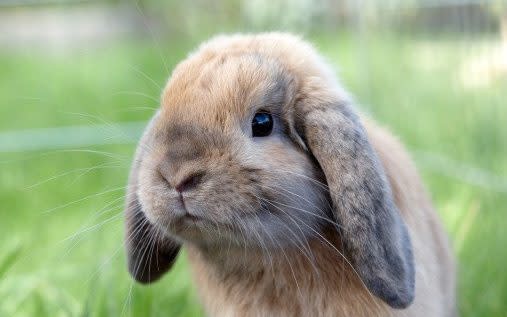Domestic rabbits often lead miserable, disease-ridden lives because owners wrongly believe they need minimal care

Domestic rabbits often lead miserable, disease-ridden lives because their owners wrongly believe they need minimal care and handling, a new study has shown.
Researchers at the Royal Veterinary College collected data from 6,349 rabbits that attended 107 veterinary care clinics across the UK.
They found that the most common cause of death, recorded by vets, are flystrike, with 10.9 per cent of pet rabbits dying this way.
A further 4.9 per cent died of anorexia, 4.9 per cent of collapse and 4.3 per cent of and gut stasis.
The VetCompass study also revealed the average lifespan of pet rabbits was just 4.3 years, although survival up to 14.4 years has been recorded.
Male rabbits tend to live longer at 5.2 years on average compared to the 3.7 years females live on average but males are more likely to have overgrown claws, overgrown molars, overgrown incisors and dental disease.
The majority of health problems, said the study, were due to inappropriate housing or feeding.
However, evolution has meant rabbits can disguise external signs of disease so that they are less likely to be targeted by predators but this also makes it harder for owners to spot that their rabbit is ill until it is often too late.
Dr Dan O’Neill, VetCompassTM researcher and Senior Lecturer at the RVC, said: “For years, rabbits were considered as the perfect child’s pet: fluffy, cute, passive and only needing minimal care and handling while being fed muesli-type food in a hutch in the garden where it was generally kept on its own.
“We now know that this level of care is completely unacceptable from a welfare perspective.
Dr Jo Hedley, VetCompass researcher and Lecturer at the RVC, added: “The causes of death recorded are in fact often just end-stage symptoms of underlying disease.
“Many of the key medical issues are still problems that we should be able to completely prevent by appropriate husbandry, diet and health checks.
“Better owner education is necessary if we are to improve rabbit health and welfare in future years.”
She added that the mammals ability to “hide disease” meant that symptoms were often recognised “far too late”.
Dr O’Neill said he hoped the paper would help to improve the lives of domestic rabbits by “helping owners and vets to recognise the common health problems”.

 Yahoo News
Yahoo News 